Dominitz: Georgia Southern, college football take on issue bigger than a game in mental health
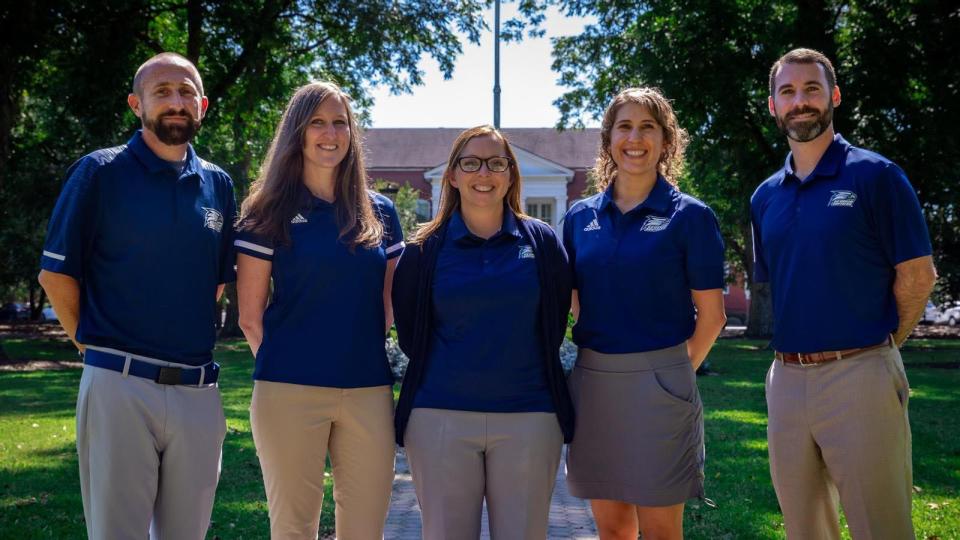
STATESBORO — Eliminate the stigma. Don't be judgmental of those with mental health concerns. Be supportive and encourage those suffering in silence to get professional help.
"It's OK to not be OK," said Brandonn Harris, a Georgia Southern University professor and the program director of sport and exercise psychology.
He also is a sport psychologist with Georgia Southern Athletics' Mental Performance Team, which provides a safe environment for "comprehensive, holistic and collaborative mental health and optimal mental training services to student-athletes and athletic department stakeholders," according to the athletics department website.
In other words, athletes, coaches and staff have access to resources to make them "the best versions of themselves," Harris said. Whether that means mental skills and performance enhancements for on the field of play, or help handling the demands and pressures that come with college athletics and academics.
Harris is a point person for the football program's partnership this month with Hilinski's Hope, the foundation Kym and Mark Hilinski started in honor of their son Tyler, the former Washington State University quarterback who died by suicide following his junior season in January 2018.
The third annual College Football Mental Health Week was Oct. 1-8, and World Mental Health Day is Monday, Oct. 10. Georgia Southern was on the road for those two Saturdays, so the Eagles shifted their participation a bit on the calendar. They wore decals on their helmets Saturday at Georgia State, and will do the same this coming Saturday against James Madison at Paulson Stadium in Statesboro.
'Everyone has a hard time': UGA athletes navigate careers with mental health in the balance
Investing in more resources: How UGA and other SEC schools are responding to meet mental health needs of its athletes
Personal tragedy, national initiative: How a family turned tragedy into a mission to promote mental health for college athletes
The decal is a green ribbon with Tyler Hilinski's No. 3, just one of many elements increasing awareness and education about mental health and wellness programs. The initiative has participation from about 120 schools, including fellow Sun Belt Conference member James Madison.
"While conversations around mental illness can be tough and at times uncomfortable, it is absolutely critical for the well-being of our student-athletes," Kym Hilinski said in a press release from the nonprofit organization. "We have spoken on dozens of campuses to help encourage these conversations and share Tyler's story. We miss Tyler every day, but we are grateful to know that what we are doing is making a difference and that he would be proud of us."
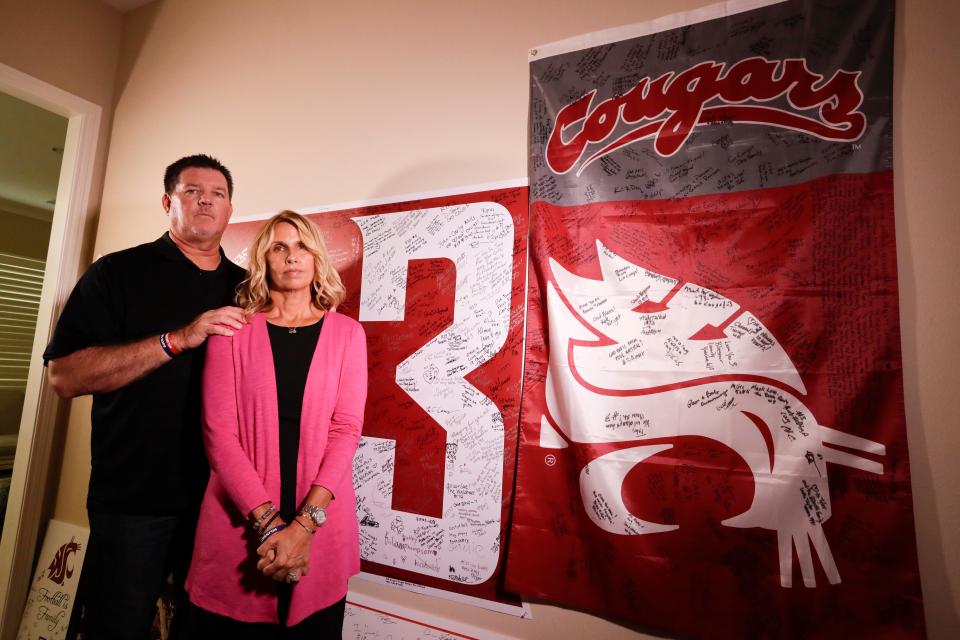
The mission is to make mental health a bigger part of the conversation, and provide student-athletes and all students, coaches, staff, everyone, with information on how to get help.
Georgia Southern has decals, wristbands, bows and headbands provided by Hilinski's Hope for athletes of varying sports to wear, Harris said. The university also will be sharing content at the home game and on social media this week to bring attention to mental health resources.
Last season, with Georgia Southern's first partnership with the annual program, Eagles defensive end Dillon Springer and center Logan Langemeier led player involvement, with a video produced of various Eagles reading stanzas from Springer's poem about the subject.
Get Eagles news in your inbox: Sign-up for our free, weekly newsletter on all things Georgia Southern sports
"This is a special initiative," said Eagles first-year head coach Clay Helton. "I credit our student-athletes, who not only supported but engaged last year and have carried it on this year."
Helton has a personal connection to the Hilinski family. Helton was an assistant, offensive coordinator and then head coach at Southern Cal from 2010-21. He recalled recruiting in California the Hilinski brothers — quarterbacks Kelly, Tyler and Ryan (formerly at South Carolina and now at Northwestern).
The college football world is quite small in some ways, and Tyler Hilinski's death was shocking.
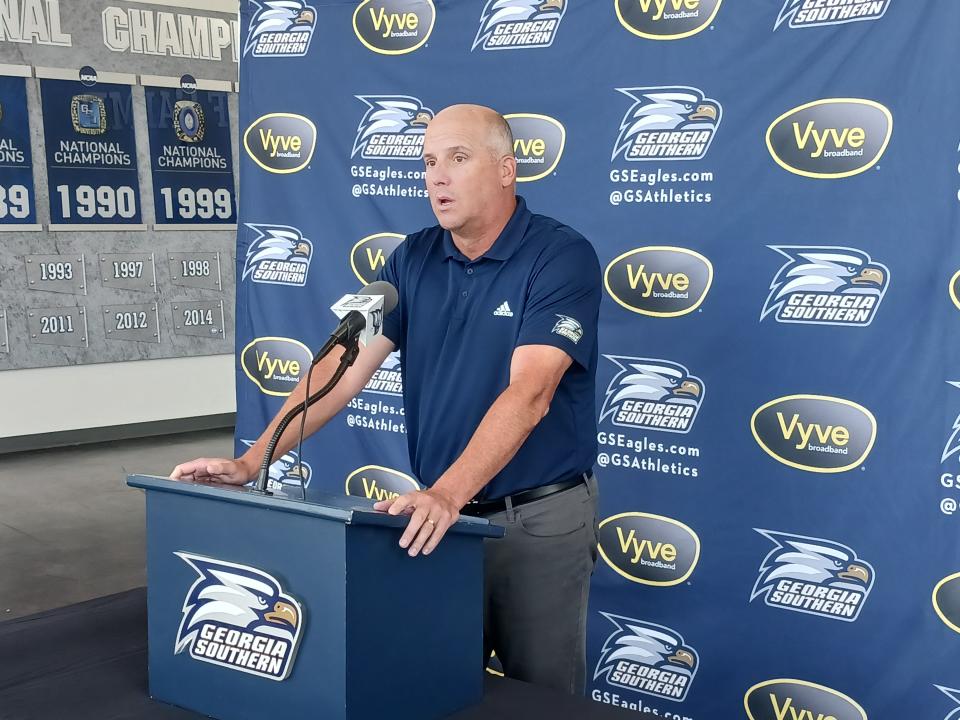
"To lose Tyler was devastating and heartbreaking I think not only to the football community but every parent," Helton said. "I credit his parents and what they've done to really put the topic of discussion across the entire country.
"I'm so proud of our kids; they've brought it to the forefront," the coach continued. "It's one of the most important topics that we have right now in college football as well as for young people, is to be there and support them because this is something that is real. It's something happening across the country. Our first priority will always be the health and safety of our student-athletes and our students. I'm so proud of our students and our university for supporting this. It is a great cause and it's something we all should be talking about."
Marques Watson-Trent, a redshirt-sophomore linebacker, said, "mental health is a real thing" and it was important they use their voices to spread awareness and provide information to those in need.
Going to get help
There is a stigma associated with "help-seeking behavior" for mental health issues, Harris said. Think about how counterintuitive that is. We want, and expect, athletes to get treatment for their physical well-being, and there are resources and finances invested in that health category.
But sometimes the tough-it-out attitude applies to physical ailments, and a lot of time the mental side is ignored. It can be complicated, uncomfortable, avoided, and that is dangerous.
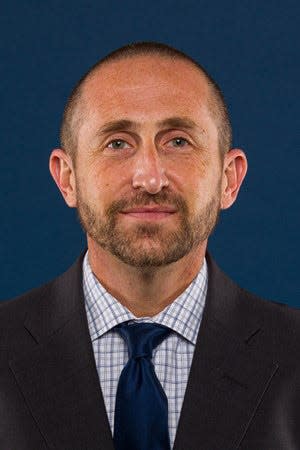
"For college football players, I think sometimes the perception might be you're talking about these incredibly strong, kind of tough human beings that do incredible things on the field," Harris said.
But they are human beings first. And humans can face tough times and situations, such as feeling pressure to perform at a high, even perfect level. Successes and failures are magnified beyond the games and team dynamic and across the internet through social media posts.
"Being a student-athlete does not leave them to be impervious to difficult scenarios," Harris said. "They deserve the same type of support and resources as anybody else."
Harris noted how high-profile professional and Olympic athletes have used their platform to share their personal struggles with mental health issues. That helps reduce the stigma and normalizes the idea, as it should, that addressing mental health is a sign of strength. To be mentally tough requires being vulnerable and doing some hard things.
It's a step in the right direction to change the culture to greater acceptance.
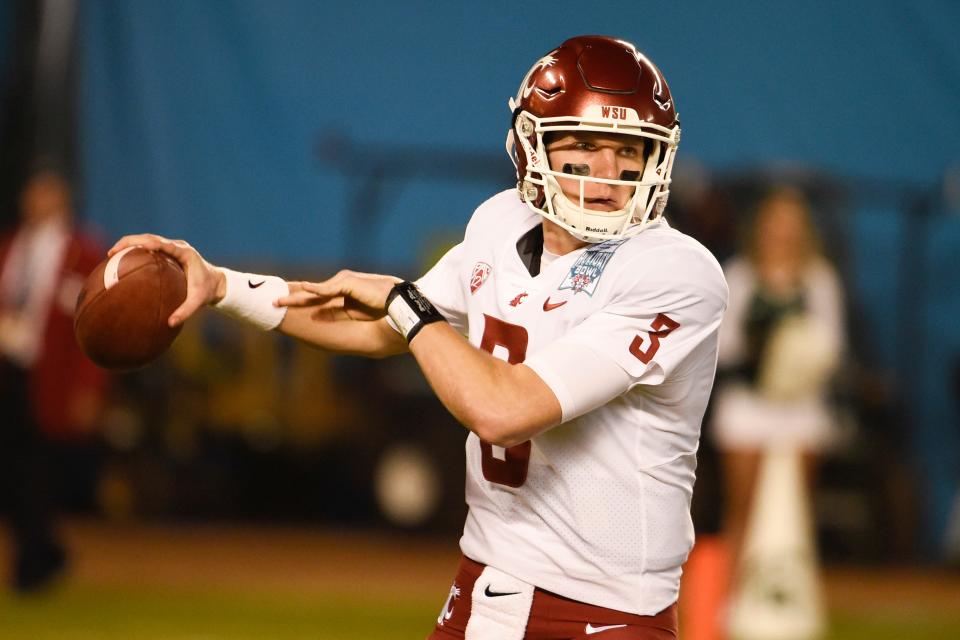
"Talking about your mental health takes guts," Ryan Hilinski said in a press release. "It shows strength to be vulnerable, but that is what is needed to be real with your teammates, coaches, and family. I'm proud of my family for creating College Football Mental Health Week to help all student-athletes to know that they are not alone."
There's a big difference between feeling lonely and truly being alone, Harris said.
"We want our student-athletes here on campus to know that they're never alone," Harris said. "We have a lot of people that care deeply for them and resources here to help support them any way that we can."
Read more about it
For a profile of the Hilinski family and its foundation, as well as more about University of Georgia athletes and how the UGA athletics department and other Southeastern Conference schools are addressing mental health issues, read the comprehensive three-part series from reporter Marc Weiszer of the Athens Banner-Herald at https://www.onlineathens.com/story/sports/college/bulldogs-extra/2022/10/03/georgia-bulldogs-mental-health-uga-football/10387185002/.

This series contains discussion of suicide. If you or someone you know may be struggling with suicidal thoughts, call the national suicide prevention lifeline at 800-273-8255.
For more about Hilinski's Hope Foundation, go to https://www.hilinskishope.org/
Nathan Dominitz is the Sports Content Editor of the Savannah Morning News and savannahnow.com. Email him at ndominitz@savannahnow.com. Twitter: @NathanDominitz
This article originally appeared on Savannah Morning News: Georgia Southern football team promotes mental health, Hilinski's Hope

